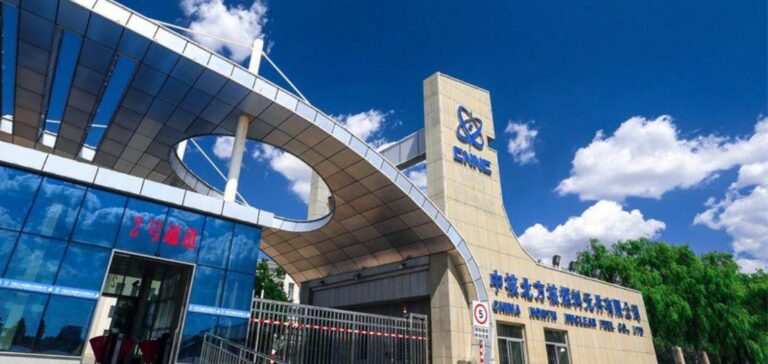The China National Nuclear Corporation (CNNC) has officially launched the search for international financing for the first phase of its nuclear project located in Xuwei, in the port city of Lianyungang, Jiangsu province. This project stands out by combining two nuclear technologies: High-Temperature Gas-cooled Reactors (HTGR) coupled with two Pressurized Water Reactors (PWR). The developed model aims to simultaneously provide high-temperature industrial heat and electrical energy to the national grid. CNNC thus seeks to diversify its energy offering while meeting local industrial needs.
An unprecedented hybrid technical concept
The project’s primary interest lies in its capability to integrate distinct nuclear technologies, enabling dual production of energy and industrial heat. HTGR reactors, known for their ability to generate extremely high temperatures, could directly supply the necessary heat for energy-intensive industrial processes, particularly in petrochemical and manufacturing sectors. Simultaneously, the pressurized water reactors would continue supplying electricity to regional urban and industrial infrastructures.
This technological coupling represents a significant innovation in China’s nuclear strategy, aiming to optimize energy resources while reducing dependence on fossil fuels for heavy industrial activities. CNNC has already completed critical preliminary stages, including project validation by China’s State Council, embedding this initiative within a broader national program involving the simultaneous construction of eleven new nuclear reactors nationwide.
Market context and investment strategy
During the project’s financing-focused meeting, CNNC engaged a panel of institutional and private investors, presenting the envisioned economic model along with long-term profitability prospects. The goal is to secure adequate financing to match the high costs associated with the project’s technological complexity. At this stage, the company has not publicly disclosed the targeted funding amounts, but the proposed economic model relies on the commercial viability of the industrial-nuclear coupling.
Alongside this project, CNNC continues to strengthen its international strategic alliances. In June 2024, the company signed a Memorandum of Understanding with Emirates Nuclear Energy Corporation (ENEC) of the United Arab Emirates, focusing on cooperation in nuclear fuel supply and technical and operational expertise sharing. This collaboration could positively influence international investors’ reception of the Xuwei project, confirming CNNC’s intention to leverage a robust international network to advance its new nuclear projects.
Industrial and commercial outlook
On the international energy market, the Chinese project illustrates an emerging trend of technological integration and diversification of nuclear energy uses, extending beyond traditional electricity production. Sector stakeholders, particularly those exploring hybrid energy models capable of meeting the growing demand for sustainable and competitive industrial energy, will closely monitor the project’s outcomes.
CNNC’s ability to attract sufficient investment will be critical for the project’s success and its potential replication in other industrial markets globally. Thus, the financing kickoff meeting represents not only an administrative milestone but also a significant indicator of future international investments in next-generation nuclear infrastructures.






















